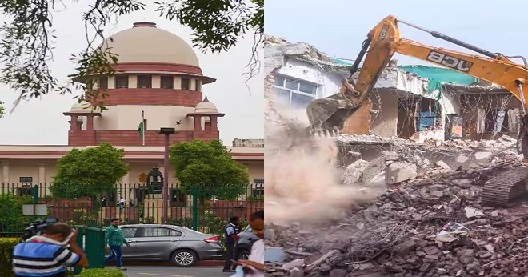Last Updated on October 1, 2024 9:24 pm by INDIAN AWAAZ
AMN / WEB DESK
The Supreme Court on Tuesday heard the petition against bulldozer action and said that it will lay down guidelines for all citizens on the issue of demolition of properties. The apex court has reserved its verdict. In the pleas, petitioners have alleged that properties, including those of those accused in the crime, were being demolished in several states.
Observing that its directions will apply to pan-India, the top court said it will make it clear that a person being accused of a crime can’t be grounds for demolition of his property. A division bench of Justices B R Gavai and K V Viswanathan was hearing the pleas. The bench said, “Whatever we are laying down, we are a secular country. We are laying it down for all the citizens, for all the institutions not for any particular community.”
The Supreme Court, in a landmark decision, emphasized that public safety takes precedence over religious structures encroaching on roads, water bodies, or rail tracks. The court reaffirmed India’s secular status, underscoring that its directives on bulldozer action and anti-encroachment drives will apply uniformly to all citizens, regardless of their faith.
The remarks were made by a two-judge bench, comprising of Justice BR Gavai and Justice KV Viswanathan, while hearing petitions challenging bulldozer action against criminals. “Whether it be temple, dargah, it has to go…public safety is paramount,” Justice Gavai said during the hearing.
The trend has become popular in several states who have now started demolishing structures linked to people accused of a crime. The practice has raised concerns about targeted demolitions against a particular community or religion.
Solicitor General Tushar Mehta, representing Uttar Pradesh, Gujarat, and Madhya Pradesh, clarified that being accused in a criminal case does not justify bulldozer action, even for severe crimes like rape or terrorism. Mehta emphasized the importance of prior notice, suggesting that it should be issued via registered post to ensure fairness.
While hearing a batch of pleas against bulldozer actions in various states, the Supreme Court on September 17 passed an interim order that no demolition of properties should take place in the country without its permission.
The apex court had then said that the order is not applicable to encroachments on public roads, footpaths, railway lines, or other public spaces.

